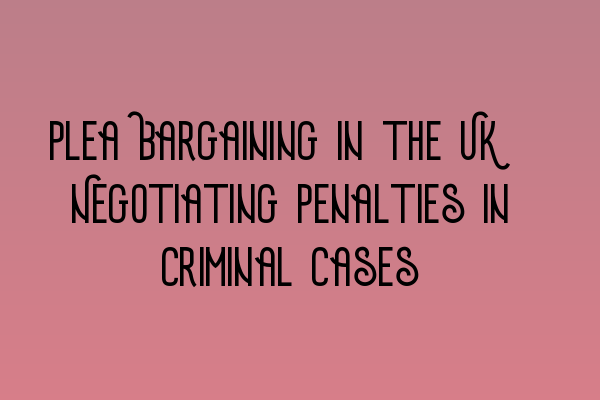Plea Bargaining in the UK: Negotiating Penalties in Criminal Cases
When it comes to criminal cases in the UK, plea bargaining has become an important mechanism for negotiating penalties. Plea bargaining allows the prosecution and the defense to reach a mutually satisfactory agreement, thereby avoiding a time-consuming and expensive trial process. This blog post will provide an overview of plea bargaining in the UK, its benefits, and the considerations both the prosecution and defense need to make.
The Basics of Plea Bargaining
Before delving into the details, it’s important to understand the basics of plea bargaining. Plea bargaining involves the exchange of concessions between the prosecution and the defense. In exchange for the defendant’s guilty plea, the prosecution might offer reduced charges, a lesser sentence, or both. The defendant, in turn, avoids the uncertainty of trial and the potential for a harsher sentence upon conviction.
The Benefits of Plea Bargaining
There are several key benefits to plea bargaining in criminal cases. First and foremost, it helps to alleviate the burden on the court system by resolving cases more efficiently. Plea bargaining also allows for a more predictable outcome, as both parties have a degree of control over the negotiations. Additionally, plea bargaining can result in lighter sentences for defendants, reducing the potential long-term impact of a criminal conviction.
Considerations for the Prosecution
For the prosecution, plea bargaining is not without its considerations. Prior to engaging in plea negotiations, the prosecution must carefully evaluate the strength of the case. If the evidence is weak, the prosecution may be more inclined to offer favorable plea deals to secure a conviction. However, if the evidence is strong, the prosecution may be less likely to offer substantial concessions during negotiations.
Moreover, the prosecution must also consider the potential public perception of plea bargaining. Critics argue that plea bargaining allows criminals to “get off easy,” which can be detrimental to the perceived fairness of the criminal justice system. As a result, the prosecution must balance the desire to secure a conviction with the need to maintain public trust and confidence.
Considerations for the Defense
On the defense side, plea bargaining presents its own set of considerations. The defense must assess the strength of their case and weigh it against the potential outcomes of a trial. If the evidence against the defendant is overwhelming, it may be in their best interest to accept a plea deal in order to minimize the potential penalties.
However, if the defense believes they have a strong case, they may choose to reject a plea deal and proceed to trial. This decision often involves a careful evaluation of the potential risks and rewards, including the possibility of a more favorable outcome in court.
Conclusion
Plea bargaining is a valuable tool in the criminal justice system, providing an alternative to lengthy trials and allowing for negotiated resolutions in criminal cases. While it has its pros and cons, plea bargaining benefits both the prosecution and the defense by providing a more efficient and predictable means of resolving criminal charges.
If you’re interested in learning more about criminal law and practice in the UK, be sure to check out our related articles:
- SQE 1 Practice Exam Questions
- SQE 1 Practice Mocks FLK1 FLK2
- SQE 2 Preparation Courses
- SQE 1 Preparation Courses
- SRA SQE Exam Dates
